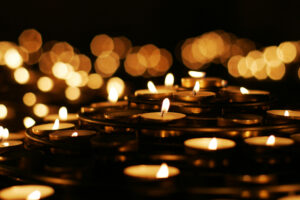Around the world, holiday traditions create connections and a sense of belonging between families and communities. With Christmas fast approaching, students at Bishop Perowne have been reflecting on the importance of religious and cultural celebrations in their lives.
While lots of our students are looking forward to celebrating Christmas this month, many are excited to celebrate other festivals throughout the coming year. So, we asked some of our students to tell us about their favourite celebrations and traditions within their family, and why they are important to them.
Ella Obialor, from Nigeria (Year 10)
“In Nigeria, Christmas is very important, and it is like a celebration of prosperities. People from all over the society come together on the night of Christmas Eve by 5pm to pray and be together as one. We all light candles to signify love and life because we believe the birth of Jesus brought love to the world. We sometimes play games, tell stories and plan our New Year’s resolutions.
“Once it is 12am, we all exchange our candles and put them out. Then, fireworks are lit and displayed. The celebration begins and we have a toast to love and life with red wine, or milk for the younger ones. Then, when its 7am we all go to church to pray and give offerings to God.
“This is how Christmas was celebrated when I was in Nigeria – with loved ones and family, because we believe Christmas brings families together. And because, no matter the religion in Nigeria, the birth of Christ is important and cherished.”
Ahsan Mushtaq, from Pakistan (Year 10)
“We are a Muslim family, so we celebrate Ramadan, which is a festival that happens in Pakistan for 30 days. We have to fast, which means we cannot have any food or drink. We can only have food in the morning or at night-time. At night-time you can eat as much as you want.
“When it is time to open Roza (open the fast), the whole family gets together and waits for a siren to sound in the Masjid before eating lots of food. Sometimes we open Roza in the Masjid and feed the poor. We have to pray five Namaz every day during Ramadan. There are three days where we do something extra (like good deeds), and at the end of the festival you receive gifts like clothes, drinks and money from visitors if you completed these three days.”
Oleh Nykolyn and Andrii Nykyforets, from Ukraine (Year 11 and 8)
“Christmas is a very important holiday in Ukraine, but not as important as in England. In the UK, people can sometimes start celebrating Christmas a month before it starts, but in Ukraine, New Year is usually more of a holiday then Christmas. The tradition to gift presents happens mostly at New Year. You can still get presents for Christmas, but not as much as during New Year.
“In Ukraine, Christmas starts on the 25th December. There is an old Ukrainian tradition to walk around different houses and sing Christmas carols. The host, in return, must give you money. It is usually celebrated at home, with close or extended family.”
Rikrisa Maharjan, from Nepal (Year 9)
“In Nepal, our main event is called Diwali (row of lights). Diwali is a five-day celebration which includes food, fireworks, coloured sand and special candles and lights. Over these five days, we celebrate Our Lord Ganesha and Goddess Laxmi to bring healthy life, riches, happiness and prosperity. We celebrate Diwali to show awareness of the inner light. It’s a way to celebrate the awakening which has the power to outshine darkness and clear all obstacles in life.
“Our second biggest festival is called Tihar. We have to make our house spotlessly clean and decorate it beautifully. Tihar marks the end of the harvest season and is also the time to respect the Hindu god of death, Yama, for his protection. Tihar is also a celebration which lasts for five days. Each day celebrates one of the four creatures associated with Yama – the crow, the dog, the cow and the ox.
“The last day (Bhai Tika) celebrates the people themselves. On this day, sisters put Tika on their brothers’ foreheads if they have no brothers, male cousins are fine too since they are seen as our brothers). Then, brothers put Tika on their sisters’ foreheads. This is to show gratefulness for the bond between brothers and sisters.”
Eren Boynukisa, from Turkey (Year 11)
“My family is Muslim, so we don’t celebrate Christmas, but we celebrate the New Year. We make a little festival in our homes, and my family enjoys inviting people round to watch fireworks and movies with popcorn.”
Katie Suen, from Hong Kong (Year 11)
“We celebrate the Chinese New Year (which is also known as the Lunar New Year) in Hong Kong. This holiday happens at the end of January every year. We celebrate it at different relatives’ homes, so relatives who don’t see each other will often meet during the Lunar New Year. Children stay at the elder’s home during Chinese New Year and get given money in red envelopes, which is meant to encourage them.”


